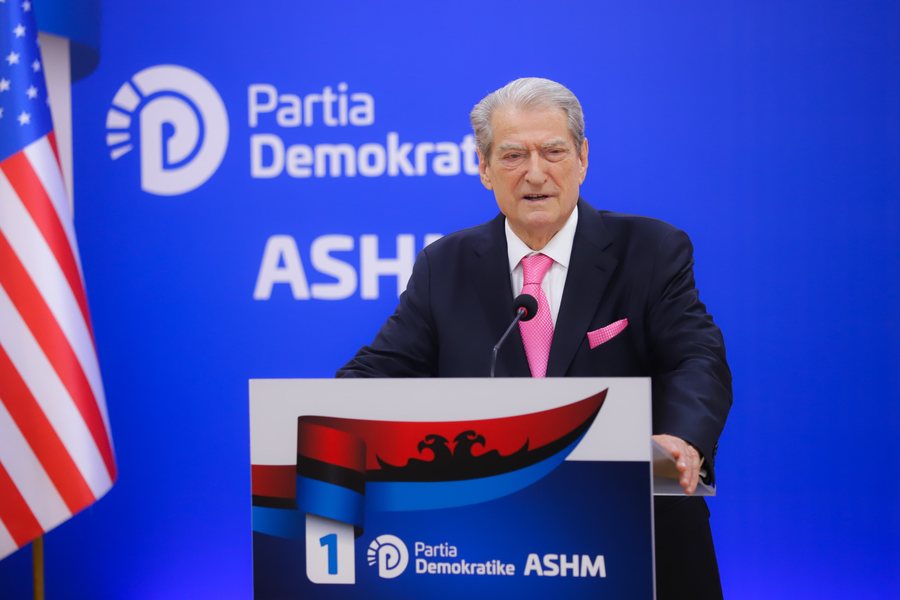Berisha claims travel breakthrough to US—but ‘non-grata’ designation remains in place

Photo: Sali Berisha, leader of the Democratic Party.
A tweet from an American journalist on Wednesday triggered a political firestorm in Albania, as allies of opposition leader Sali Berisha celebrated what they claimed was a reversal of his travel ban to the United States. But closer scrutiny reveals the situation is far more ambiguous—and that the former prime minister and his family remain under the same U.S. sanctions he has faced since 2021.
Why is this important: The tweet—posted by right-wing journalist Marc Caputo—was seized upon by Berisha’s Democratic Party as proof that the U.S. under the Trump administration is changing its position regarding Berisha’s “non grata” designation for corruption and that the travel ban has been lifted. However, the text itself refers only to the possibility of a visa waiver, a mechanism the U.S. has long used in specific cases that do not affect the underlying designation. Analysts say the move is unlikely to affect the outcome of Albania’s May 11 elections.
Context: Predictably, the news quickly gained traction in Albanian media, which immediately tied it to the Democratic Party’s $6 million lobbying contract—a scandal that has drawn intense public scrutiny. Many questioned whether the tweet justified the steep financial and reputational cost, especially given the potential criminal consequences the party may now face.
In the tweet, Caputo wrote: “I asked State about Berisha’s visa status & was told he could come to the US. ‘We routinely grant waivers to facilitate designated individuals’ travel to the U.S. consistent with international obligations and our national interests. As such, we won’t let our foreign policy interests or relationship with Albania be held hostage by politicized Biden-era decisions.’”
The tweet does not mention who precisely “State” is. While criticizing “Biden-era decisions” it makes no mention of any policy reversal. Visa waivers have in the past been granted even to high-profile authoritarian leaders such as Iran’s Mahmoud Ahmadinejad or Venezuela’s Nicolás Maduro, without changing their status. The U.S. Embassy in Tirana has currently not responded to a request for clarification from the Albanian Times.
Despite this, Berisha is said to have issued internal instructions to all his party’s candidates urging them to post celebratory videos and statuses on social media. In an electoral meeting in Shkodër, he appeared flanked by Trump campaign figures Chris LaCivita and Paul Manafort—both seen as part of a broader effort to amplify the announcement. Manafort, who was convicted in the U.S. in 2018 for financial crimes linked to pro-Russian lobbying, appeared publicly alongside Berisha for the first time. Speaking to the crowd about the development, he thanked President Trump “for cutting the head of the snake, Soros.” Berisha has long claimed that his non-grata designation as well as his legal troubles in Albania where he is being tried alongside his son-in-law for corruption, were sponsored by Soros as part of a left-wing conspiracy that aimed to cement Edi Rama in power in Albania.
What else: The government dismissed the development. Prime Minister Edi Rama reacted with open mockery, saying he had initially hoped Berisha had truly been cleared—only to discover it was “yet another swamp mirage.” Social media erupted with jokes about the cost of lobbying for an anonymous tweet, with one former ally joking that Berisha could have been smuggled into the U.S. from Mexico “for far less than $6 million.”
What’s next: Although the tweet has dominated the news cycle, most commentators agree that unless the designation is formally lifted, the political impact will be minimal and short-lived. “This is like mistaking a prisoner’s funeral leave for a full acquittal,” said one analyst.
Indeed, the designation by Secretary of State Antony Blinken—citing Berisha’s involvement in significant corruption and obstruction of justice—remains publicly listed on the U.S. State Department’s website. No official statement has been made by the U.S. government to suggest it has been rescinded.


